When Oscar Wilde famously remarked that nothing succeeds like excess, he wasn’t talking about managing data in clinical trials.
We already have “more data that we ever dreamed of having” about patients, but “will we have the right data?” asked Paul Evans, PhD, president and CEO of Velocity Clinical Research in a presentation at the recent ACRP 2019 gathering in Nashville, Tenn. “The data on its own, of course, is worthless…it’s the insight it gives you that [delivers] the value,” he added.
“Too much technology is a solution looking for a problem,” Evans said. “What we need to do is identify the problem and get clear about that, and then find the technology to change that. It comes down to that understanding and having the right questions to ask in the first place.”
While stressing he’s an advocate for new technology that enhances efficiencies and delivers other positives, Evans called on technology developers to do a better job at including sites earlier in the design schedule. “And I’d be the first one to say, having been [at the other end], that we didn’t always think about sites first,” he said.
Evans began his career establishing and managing research sites in the United Kingdom, and founded one of the earliest European site management organizations. He pioneered patient recruitment approaches in the early 2000s, then joined the contract research organization (CRO) sector in 2005, building global site networks that partnered strategically rather than being selected tactically by the CRO. In two of the world’s largest CROs, he has led global functions that have included site intelligence, study start-up, feasibility, site contracting, patient recruitment, and investigator payments.
In a previous professional life, Evans said he and his team would put a finished technology in front of a site focus group and say, “’What do you think? Do you want this button on the right or the left?’ Often the answer was, ‘I didn’t want that bloody button at all, actually. What did you do that for?’”
“Let’s bring sites in from the beginning,” Evans said. “I think it will make things a lot more beneficial for all of us.”
Author: Michael Causey



